After a successful late season in 2013, Spain’s Carolina Marin is looking for more great things in 2014, which basically began with a rematch against Ratchanok Intanon in Korea.
By Don Hearn. Photos: Badmintonphoto
Carolina Marin of Spain had a shaky but successful finish to 2013. After her World Championship campaign ended at the quarter-final stage with a three-game loss to eventual winner Ratchanok Intanon, the twenty-year-old staved off injuries long enough to take the first Grand Prix Gold title of her career and in the history of Spanish badminton. She then followed up her success at the London Grand Prix Gold with another title at the Scottish Open Grand Prix.
Just before her rematch with Ratchanok, at the season-opening Victor Korea Open Superseries, Marin took some time to talk to Badzine about the career path that has led her here.
Badzine: It seems that your two Grand Prix titles this past fall were a real milestone in your career as a badminton player. Can you take us through that period?
Carolina Marin: I had just a one week break after the World Championships and then the Indian Badminton League and then I had two weeks for practice before the London Grand Prix Gold. I had a slight knee injury but otherwise I gave a hundred percent when I played. I think that when you do all you can, even when you are not at 100%, it is more important even than just being at 100% fitness.
After London, I was injured and went to the doctor and I had to rest for a month and a half and came back at the Scottish Open [Grand Prix]. I had to cancel the Denmark and French Open and the Bitburger. The Scottish Open wasn’t my best tournament but I still gave my best.
Then I played the Irish International and I played really badly and I went back to Spain and stayed out of competition but I came back at the Italian International and I played against the same girl who beat me in Ireland and I played a really good game. I was looking forward to playing well in that match.
Badzine: Has your injury completely healed now?
Marin: My knee is okay now. Maybe I can’t say it is 100% healed but when you’re injured you have to live with some pain and now I have to still be careful but it’s okay.
Badzine: Your next match at the Korea Open is most likely against Ratchanok Intanon. Is this the first time you will have played her since the World Championships?
Marin: Yes, I played her twice: once at the World Championships last year and once at the Denmark Open in 2010 and I lost both times. Of course, I am looking forward to playing her again tomorrow.
I think I have to be ready for everything because she’s a really, really good player. She has a very good attack and of course I’m looking forward to meeting her here because for me, it’s another opportunity.
Badzine: Before last year, you were mainly known for your success on the European circuit, mostly in International Challenge events. Was 2013 your time to make the jump to the big leagues?
Marin: Until last year, I didn’t play so many Superseries events. I was playing mostly in Europe and with my injury it made it difficult to play more.
This year, I think we will play more outside Europe. Now we are here in Korea and next week in Malaysia and in general I think we will play in more places. I really want to improve my world ranking so that means I need to play Superseries or Grand Prix.
Badzine: Spain has had good badminton players before but it seems like you are doing something very special winning Grand Prix tournaments in what might be a difficult training situation.
Marin: Yes, I was the first Spanish player to win a Grand Prix Gold and also a Grand Prix but now we also have some very good junior players in Spain and they are helping us now, both me and my partner Beatriz [Corrales].
But of course, I don’t have good sparring, like at the same level as me. I always say that if you go to China or Indonesia, they always have 5 or 6 players who can train together and improve but in Spain, or maybe in Europe, we don’t have this. We only have one or two good players but not like in Asia.
I would like to play against a girl but I have to play against boys because we don’t have any top women in Spain.
Badzine: Do you think you might have some extra motivation because everything you do is like a first for Spain?
Marin: I feel like I am the image for badminton in Spain and I feel like I have this responsibility to do my best for Spain and I am a very competitive girl – that is just my character.
I feel that I am happy to be the image for Spain. It’s like everybody would like to see me on the TV or they go to a tournament to watch me and the give me motivation and of course it’s good for me. They always send me messages by Facebook and Twitter and it’s really good motivation for me.
Badzine: Do you think that your accomplishments have improved badminton’s popularity in Spain?
Marin: Maybe I’d have to say yes because the last time I won a tournament, they published an interview in the newspaper and they always want to call me or email me so for Spanish badminton it’s so good. If my partner or I can win a big tournament then the newspaper or TV can publicize that.
Badzine: A few days after Ratchanok beat you in Guangzhou, she ended up meeting the Queen of Thailand. Do you think you’ll get a chance like that?
Marin: I know she did, but I’m not expecting something like that. But the President of the Spanish Badminton Federation was at the World Championships and of course, he gave me a big congratulation for my match against Ratchanok and for my tournament because I was doing so well.
This gives me a lot of motivation and I always get so much support from the Spanish Federation and I have to say a big thanks for that.
But for the king or the queen to go to something like a badminton tournament is very difficult because badminton is not so popular. Maybe for tennis but, you know, the royal family, they have to go everywhere.
Badzine: Do you think that Spain’s amazing success in tennis just overshadows badminton or do you think that the Spanish people are more likely to pay some attention to another racquet sport because tennis is so popular?
Marin: I think that badminton is getting better recognized because even in the schools they can practice badminton so this is so good for us. But if the newspaper or television don’t pay attention to this, it will be so difficult for badminton to become more popular.
So of course, we want to win every tournament for ourselves and for Spanish badminton but if the newspaper or television can support us more it will always be better for us.
Badzine: So, in an environment like Spain, how did you end up getting into badminton?
Marin: It’s a little bit strange because I was dancing flamenco, which is a very special dance in my hometown of Huelva. One day, one of my best friends from school said ‘Hey, come to the hall and try a new sport’ and so I went with her and I practiced I said ‘Oh my god,’ the shuttle was so strange.
I started practicing for one or two hours a week, just for fun, and after one or two years, I was getting better and the coach was surprised because I improved so fast. Then I won some tournament in my hometown and the coach wanted to take me to a club in my hometown. Then I played some national tournament and I also won so it was like ‘What the…? What is she doing now?’ because I was very young.
My coach wanted to talk to the Spanish Federation president and he wanted to talk to my parents because I was only 14 years old and it was going to be difficult for my parents because I don’t have any brothers or sisters.
Now my parents are really happy with the decision they made. They always support me and they just want to see me happy and I am doing what I want and what I like so of course, they are so happy for me.
Badzine: There are several countries whose top players have decided to relocate to Denmark to get better training opportunities. Is that something that any Spanish players have tried?
Marin: Well now, in Denmark, after Tine Baun retired, they don’t have the good women’s singles players. We did have a training camp in Denmark before the Olympic Games in London because Tine Baun was there and we wanted to practice with her.
But now, even in Europe, I think there is Juliane Schenk but no other really, really top players. Before the World Championships, my partner and I went to Indonesia for a training camp. We wanted to practice with good, top players.
My coach wanted to make an academy and to get some good players to practice with us but I think it will be difficult because Spain isn’t so recognized. He is trying, though.
Badzine: Some teams in Europe have had players from Indonesia and other places in Asia relocate and add to the strength of the local scene. Has that happened in Spain?
Marin: Last year, we had some Indonesian players in Spain, but now the economy is really, really bad. There was one Indonesian player in my hometown who is really, really good so it’s good when I can go there and practice with him. But last spring, he moved to the U.S.A. because the economy is Spain is so bad. There were also two in Sevilla, who both moved away as well.
Badzine: What aspects of your game do you think you need to work on to beat some of the top ten players?
Marin: I think I need to work more on my defence because I am an aggressive girl and my game is offensive. Of course, I need to work on my offence, too, but the thing I really need to improve at is my defence. If my defence gets better, maybe I can reach the next level and start beating more of the top players.
Badzine: What would you say has been the highlight of your career so far?
Marin: I think the highlight for me was last year’s World Championships because I played at 100%. When I played against the Korean girl, I played my best. Then when I played against Ratchanok, I was so tired but I still played my best. I didn’t have an easy path, either. Before I played against Sung Ji Hyun, I had to play Firdasari and then Busanan so even though I had tough matches, I still played my best so that’s why it was my best tournament.
![Carolina Marin happy to be the image of Spanish badminton After a successful late season in 2013, Spain’s Carolina Marin is looking for more great things in 2014, which basically began with a rematch against Ratchanok Intanon in Korea. By […]](https://www.badzine.net/wp-content/uploads/Newsflash-thumbnail.png)
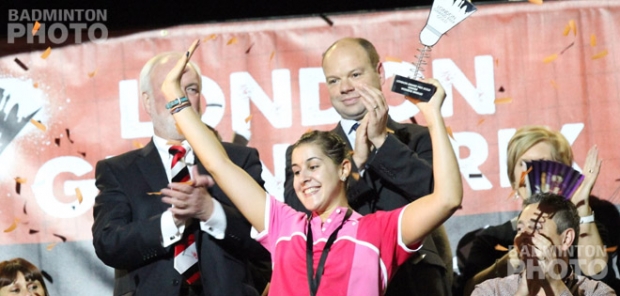
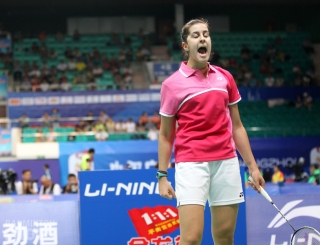
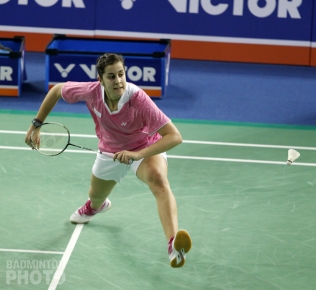
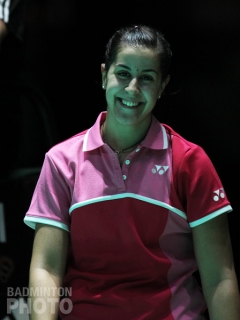
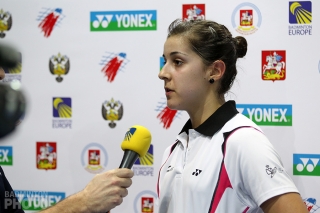
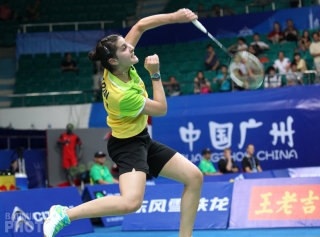
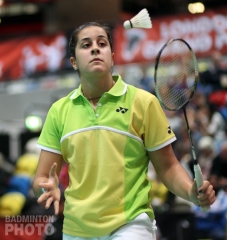
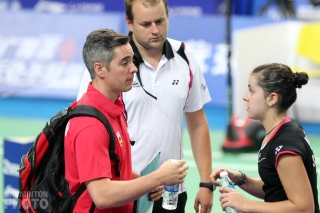
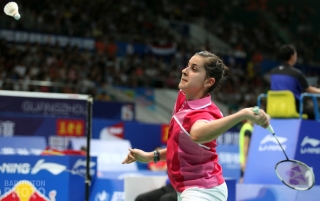

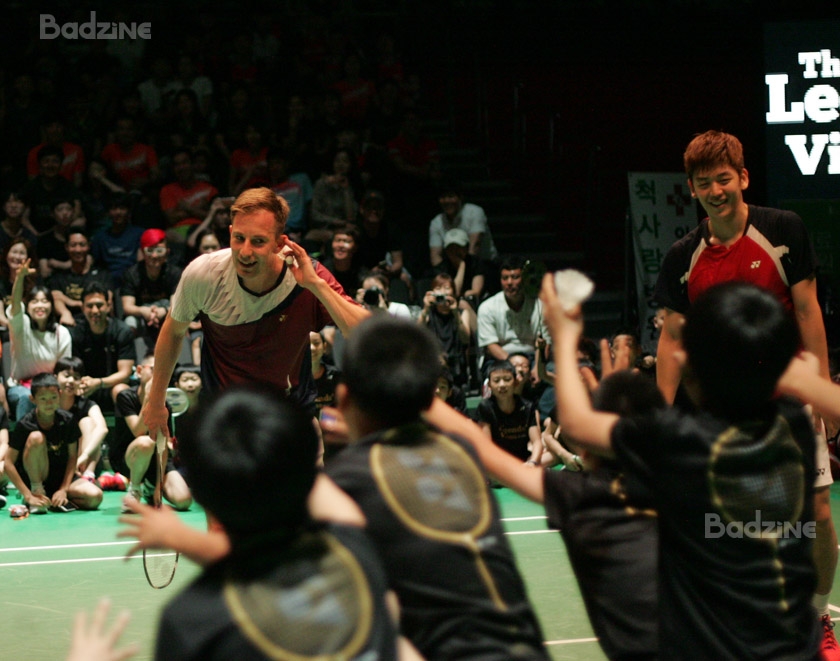
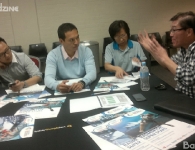
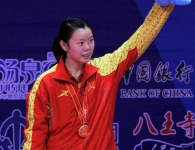
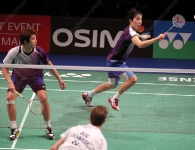
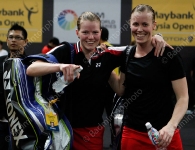
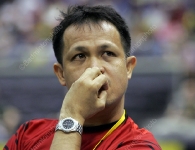
Leave a Reply